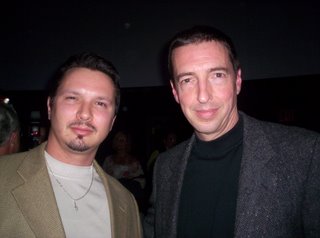My Report From "The Future of Stem Cells" Moderated by Ron Reagan.

January 24th 2006
The Franklin Institute Science Museum kicked off its first installment in what is billed as a major lecture series on health related issues this past Saturday, and boy, did they pick a hot topic. The panel discussion, titled “The Future of Stem Cells”, was moderated by one of America’s most recognized and widely respected proponent of such research, Journalist, and MSNBC commentator, Ron Reagan. Following the passing of his father, former President Ronald Reagan, who suffered from Alzheimer’s disease, he and his mother, Nancy Reagan, have been outspoken critics of the stated policies of those working to halt such research, including the Anti-Abortion lobby, and the Bush administration.
The five man panel included Jim Greenwood, the President of the Biotech Industry Organization, Paul Root Wolpe, Ph.D., Professor at the Department of Psychiatry and Senior Fellow for the Center for Bioethics at University of Pennsylvania, Dr. Ausim Azizi, Chair of Neurology at Temple, Dr. Ihor Lemischka, Professor of Molecular Biology at Princeton University, and New Jersey Assemblyman Neil Cohen, co-sponsor of New Jersey's Stem Cell Bill.
We were informed from the outset that attempts were made to include those with opinions in opposition, but all who were approached declined. In the opinion of me, and many in attendance, the lack of a credible scientific argument against such research may have played a part in their decision, and prevented the evening from devolving into a partisan political showdown.
Though much of the discussion did deal with the current status and perceived future path of stem cell technologies, the 800 pound guerrilla in the room would still have shown up, even if it was not invited. Politics, as we learned, is the biggest hurdle to Americans aspiring to contribute to, or benefit from any possible breakthroughs in this field.
Early in the discussion, Mr. Reagan cited an ABC poll stating that 70% of Americans supported stem cell research, and 30% opposed it. Within the 30%, he pointed out, is a large group who made this decision based on their personal moral beliefs, informed by either their religious or personal points of view, or misinformation. Regarding these people, he clearly stated that he understands and respects such beliefs, and those who hold them, though he disagrees with their opinion. The entire panel expressed similar positions.
Then the guerrilla stood up, so to speak. The remainder of those opposed to stem cell research, he added, seems to have reasons other than their own informed morality. This became the crux of the discussion on the future of stem cell research in America. I will give an overview of the points brought up, but will refrain from quoting anyone verbatim.
Most of the opposition put forth by this sub-percentage, consists of politicians and pundits hoping to curry favor from right-wing religious and political groups, most prominently, the leadership of the Evangelical Christian movement, and Anti-Abortion lobby.
Over the past few decades, the public debate over abortion has stagnated, along with the donation accounts of groups like the Anti-Abortion lobby. In an effort to rejuvenate the debate, and their revenue flow, these groups have successfully married these two issues in an effort to revive the “business” of abortion opposition. This has lead to fractures within political associations. Case in point, Senator Bill Frist has had a rough time squaring himself with his own party due to his support of stem cell research.
Since the debunking of South Korean scientist Hwang Woo-suk’s cloning research, such groups have attempted to cease on this to promote their side of the debate. But Assemblyman Cohen said that he had tasked his staff to search for any press articles showing any progress on that front, and found none. It was determined that the only real downside to this development is a slight delay in progress due to researchers redirecting their focus past this milestone believing that someone had already reached that mark.
One tactic used to disrupt political support for research has been to separate adult stem cells from embryonic stem cells. They argue that the research can be done without the use of the embryonic variety. To a layman, this sounds reasonable, but leads to false assumptions. Adult stem cells, while they should be included in the research, lack certain fundamental attributes. They are over specialized, like bone marrow, and do not have the “blank slate” quality like embryonic stem cells. Also, embryonic stem cells are not prone to degeneration due to continuous replication as adult cells are prone to.
In the future, the panel opined, the world will see the first treatments and therapies developed thru stem cell research in the next 5 to 10 years. Unfortunately for Americans, these breakthroughs will be made by other countries. The stumbling blocks put up by the opposition will mean three distinct hardships for America. First, the cost for treatment will be more expensive, and harder to obtain. Two, the heavy handed regulations have forced American researchers to leave the country to continue their work, draining our industries, hospitals, and universities of great thinkers. Finally, America will lose the prestige of being on the forefront of this emerging science, not to mention the patents, and jobs that come with it.
I will end this here with one direct and moving quote from Assemblyman Neil Cohen. ”I have people dying of AIDS! I have people losing their ability to see, and parts of their body from diabetes! They don’t have time for this debate! We need this funded! We need this thing done now!”





0 Comments:
Post a Comment
<< Home